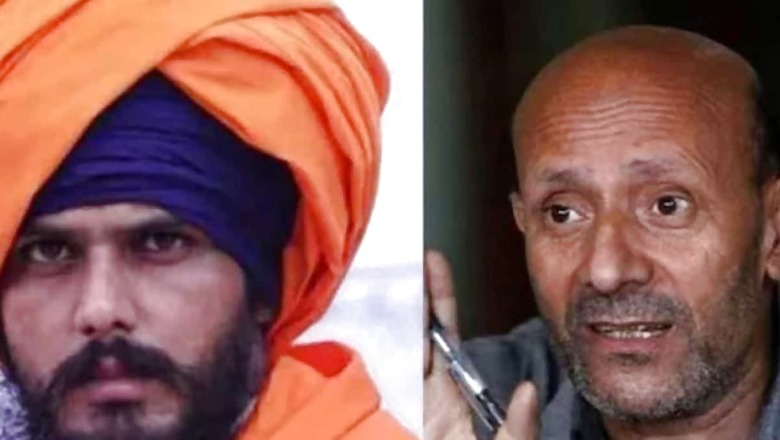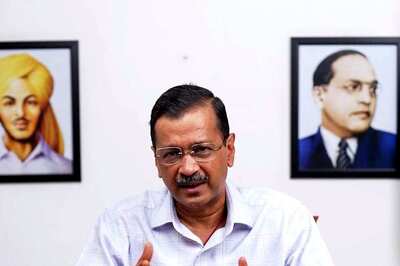
views
Amritpal Singh’s victory represents a significant and concerning takeaway from the 2024 Lok Sabha elections. An eight-member team of the Punjab police is set to escort the jailed activist to New Delhi for his swearing-in as a Member of Parliament (MP). Singh’s election to the Lok Sabha from the Khadoor Sahib constituency is particularly noteworthy given the significant margin by which he won, securing 1,97,120 votes as an Independent candidate. He defeated Congress’ Kulbir Singh Zira, with AAP’s Laljit Singh Bhullar coming in third.
Singh’s electoral success is indicative of a broader socio-political undercurrent within Punjab. His victory as an Independent candidate, unaligned with any major political party, underscores a dissatisfaction with traditional party politics and a resonance with his populist and often radical rhetoric. This is a development that warrants critical analysis, particularly given Singh’s association with the ‘Waris Punjab De’ organisation and his outspoken views that frequently echo the sentiments of the defunct and violent Khalistan movement.
Amritpal Singh’s rise in this historical context is deeply concerning. His rhetoric often blurs the line between advocating for legitimate Sikh rights and propagating separatist ideologies. The fact that he garnered substantial electoral support highlights a lingering undercurrent of discontent and the potential for radicalisation within certain segments of the Punjabi electorate. This is a troubling sign that the socio-political wounds of the past are yet to heal completely and that there remains a susceptibility to extremist influences.
Amritpal Singh’s background and activities reveal a concerning trajectory that highlights his transformation, from a transport operator in Dubai to a radical preacher and political figure in Punjab. During his time in Dubai, Singh maintained close contact with Jaswant Singh Rode, brother of Lakhbir Singh Rode, a known Khalistani militant leader. This connection provided Singh with a gateway into the world of radical Sikh separatism, setting the stage for his future activities.
In Dubai, Singh was not just a transport operator but also an individual who came in contact with operatives from Pakistan’s Inter-Services Intelligence (ISI). Sources indicate that the ISI agents saw in Singh a potential asset who could be used to reignite separatist sentiments among Sikhs in Punjab. They reportedly encouraged him to leverage religious rhetoric to motivate and radicalise young Sikhs. This strategic manipulation aimed to destabilise the region by reviving the divisive ideology of Khalistan.
Upon his return to Punjab, Amritpal Singh began to actively work towards spreading the influence of his group, Waris Punjab De, with what appears to be the covert backing of the ISI. He formed a new militant group named Anandpur Khalsa Fauj (AKF), which was characterised by its members being perpetually armed with dangerous weapons. The presence of this armed entourage not only provided Singh with a formidable personal security detail but also served as a symbol of his militant ideology and readiness for violence.
Singh’s campaign, ‘Khalsa Waheer’, was a concerted effort to strengthen his organisation by mobilising support at the grassroots level. He travelled extensively to various villages across Punjab, using religious and cultural symbols to resonate with the local populace. This campaign was not merely about religious revivalism; it was a strategic move to build a strong, ideologically driven base that could be mobilised for more significant political and militant activities.
A critical aspect of Singh’s strategy involved stirring up long-standing issues in Punjab, such as water rights, agricultural distress, and economic marginalisation. By framing these issues within a narrative of Sikh victimhood and government neglect, Singh effectively incited discontent against the Indian government. His speeches and activities were designed to create a sense of urgency and existential threat among Sikhs, pushing them towards radicalism under the guise of protecting their religion and rights.
The success of Singh’s endeavours in Punjab can be attributed to his ability to exploit religious sentiments to achieve political and militant objectives. Under his leadership, Waris Punjab De became a tool for the ISI to carry out its designs in Punjab, aiming to destabilise the region and revive the separatist Khalistani movement. Singh’s activities have thus not only undermined the social and political stability of Punjab but also posed a significant threat to national security.
Another MP who is being escorted from jail for the oath-taking ceremony is Engineer Rashid, the newly elected representative from the Baramulla constituency in Kashmir. Rashid’s victory in the 2024 Lok Sabha elections is particularly controversial, given his incarceration in Tihar Jail, Delhi, since 2017 in connection with a terror funding case. Running as an Independent candidate, Rashid defeated National Conference leader Omar Abdullah by a significant margin of more than 2 lakh votes, highlighting a dramatic anomaly in the political landscape of Jammu and Kashmir.
Engineer Rashid’s electoral success is deeply problematic for several reasons. His ongoing imprisonment for alleged involvement in terror financing raises serious questions about the broader implications for national security. Rashid’s victory suggests that a segment of the electorate in Baramulla may be disillusioned with mainstream political parties and is gravitating towards candidates who represent a more radical or oppositional stance against the Indian polity.
Rashid’s political career has been marked by his outspoken and often controversial positions on Kashmir’s autonomy and relations with the Indian state. His rhetoric has frequently aligned with separatist sentiments, advocating for greater autonomy for Jammu and Kashmir and criticising the Indian government’s policies in the region. This stance has garnered him significant support among certain sections of the Kashmiri populace, who feel marginalised and disenfranchised by mainstream political entities.
This feeling of discontent among masses is inculcated by elements like Aga Syed Ruhullah Mehdi, the Srinagar MP who defeated PDP leader Waheed Para by over 1.88 lakh votes. In a recent interview, he lamented that Kashmir has been disenfranchised of basic rights since independence, and there is anger and frustration brewing among the masses which can come out at any moment. This had a threatening undertone against the establishment and the larger Indian society. When this frustration manifests itself as mindless violence against the state, the common Kashmiri people become the primary collateral.
There is a notable parallel between the phenomena of Amritpal Singh and Engineer Rashid, which lies in the stark contrast between their lack of meaningful contributions to governance, public policy, or cultural development and their significant influence in preaching radicalisation, fomenting separatism, and being involved in terror funding. Their primary claim to fame is rooted in their radical activism rather than any substantial positive impact on society or constructive engagement in the democratic process.
The detention and subsequent electoral victories of both Singh and Rashid raise profound questions about the legal and moral dimensions of their political journeys. This scenario underscores a complex interplay between legal enforcement and democratic expression, highlighting the tension between upholding the rule of law and respecting the will of the electorate. Their cases symbolise the state’s dilemma: acknowledging the democratic process while simultaneously grappling with the serious security concerns posed by their activities. This juxtaposition of legal action and democratic mandate serves as a stark reminder of the fragile balance that must be maintained to ensure both security and democratic integrity.
The electoral success of Amritpal Singh and Engineer Rashid calls for a nuanced and comprehensive approach to address the underlying issues that have led to their rise. It necessitates a combination of stringent law enforcement measures to curb any potential resurgence of violent separatism and a robust socio-political strategy aimed at addressing legitimate grievances. This approach must involve inclusive development and meaningful dialogue to prevent further radicalisation and address the root causes of discontent among the populace.
By addressing the underlying issues through inclusive policies and development programs, the aim should be to integrate marginalised communities into the mainstream and prevent the recurrence of the dark chapters of history.
The writer takes special interest in history, culture and geopolitics. The views expressed in the above piece are personal and solely those of the author. They do not necessarily reflect News18’s views.




















Comments
0 comment